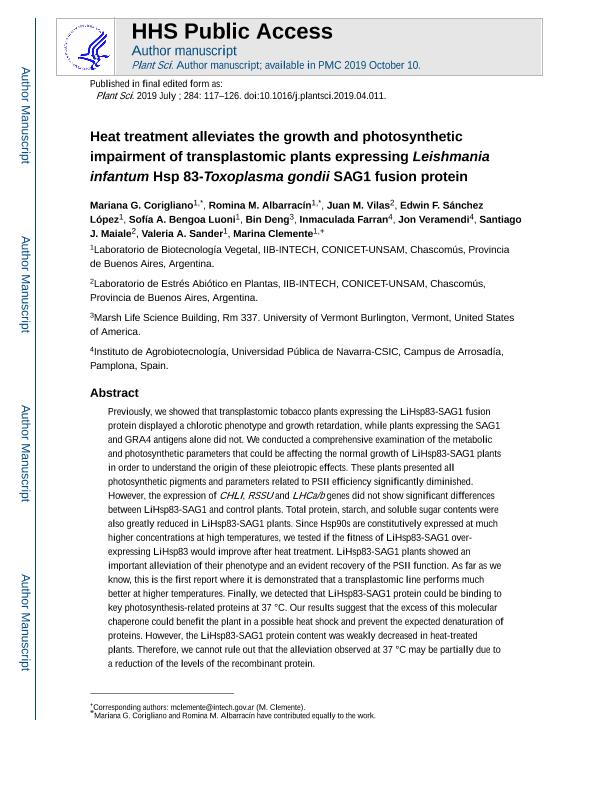Artículo
Heat treatment alleviates the growth and photosynthetic impairment of transplastomic plants expressing Leishmania infantum Hsp83-Toxoplasma gondii SAG1 fusion protein
Corigliano, Mariana Georgina ; Albarracín, Romina Mariel
; Albarracín, Romina Mariel ; Vilas, Juan Manuel
; Vilas, Juan Manuel ; Sánchez López, Edwin Fernando
; Sánchez López, Edwin Fernando ; Bengoa Luoni, Sofia Ailin
; Bengoa Luoni, Sofia Ailin ; Deng, Bin; Farran, Inmaculada; Veramendi, Jon; Maiale, Santiago Javier
; Deng, Bin; Farran, Inmaculada; Veramendi, Jon; Maiale, Santiago Javier ; Sander, Valeria Analía
; Sander, Valeria Analía ; Clemente, Marina
; Clemente, Marina
 ; Albarracín, Romina Mariel
; Albarracín, Romina Mariel ; Vilas, Juan Manuel
; Vilas, Juan Manuel ; Sánchez López, Edwin Fernando
; Sánchez López, Edwin Fernando ; Bengoa Luoni, Sofia Ailin
; Bengoa Luoni, Sofia Ailin ; Deng, Bin; Farran, Inmaculada; Veramendi, Jon; Maiale, Santiago Javier
; Deng, Bin; Farran, Inmaculada; Veramendi, Jon; Maiale, Santiago Javier ; Sander, Valeria Analía
; Sander, Valeria Analía ; Clemente, Marina
; Clemente, Marina
Fecha de publicación:
07/2019
Editorial:
Elsevier Ireland
Revista:
Plant Science
ISSN:
0168-9452
Idioma:
Inglés
Tipo de recurso:
Artículo publicado
Clasificación temática:
Resumen
Previously, we showed that transplastomic tobacco plants expressing the LiHsp83-SAG1 fusion protein displayed a chlorotic phenotype and growth retardation, while plants expressing the SAG1 and GRA4 antigens alone did not. We conducted a comprehensive examination of the metabolic and photosynthetic parameters that could be affecting the normal growth of LiHsp83-SAG1 plants in order to understand the origin of these pleiotropic effects. These plants presented all photosynthetic pigments and parameters related to PSII efficiency significantly diminished. However, the expression of CHLI, RSSU and LHCa/b genes did not show significant differences between LiHsp83-SAG1 and control plants. Total protein, starch, and soluble sugar contents were also greatly reduced in LiHsp83-SAG1 plants. Since Hsp90 s are constitutively expressed at much higher concentrations at high temperatures, we tested if the fitness of LiHsp83-SAG1 over-expressing LiHsp83 would improve after heat treatment. LiHsp83-SAG1 plants showed an important alleviation of their phenotype and an evident recovery of the PSII function. As far as we know, this is the first report where it is demonstrated that a transplastomic line performs much better at higher temperatures. Finally, we detected that LiHsp83-SAG1 protein could be binding to key photosynthesis-related proteins at 37 °C. Our results suggest that the excess of this molecular chaperone could benefit the plant in a possible heat shock and prevent the expected denaturation of proteins. However, the LiHsp83-SAG1 protein content was weakly decreased in heat-treated plants. Therefore, we cannot rule out that the alleviation observed at 37 °C may be partially due to a reduction of the levels of the recombinant protein.
Archivos asociados
Licencia
Identificadores
Colecciones
Articulos(CCT - LA PLATA)
Articulos de CTRO.CIENTIFICO TECNOL.CONICET - LA PLATA
Articulos de CTRO.CIENTIFICO TECNOL.CONICET - LA PLATA
Citación
Corigliano, Mariana Georgina; Albarracín, Romina Mariel; Vilas, Juan Manuel; Sánchez López, Edwin Fernando; Bengoa Luoni, Sofia Ailin; et al.; Heat treatment alleviates the growth and photosynthetic impairment of transplastomic plants expressing Leishmania infantum Hsp83-Toxoplasma gondii SAG1 fusion protein; Elsevier Ireland; Plant Science; 284; 7-2019; 117-126
Compartir
Altmétricas



